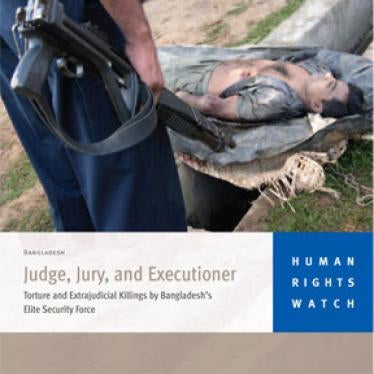(New York) - The government of Bangladesh should take urgent steps to ensure that those detained in connection with the massacre of 74 people at the Dhaka headquarters of the Bangladesh Rifles (BDR), the country's paramilitary border guards, on February 25, 2009, are not subjected to retribution, including extrajudicial killings, torture, and other mistreatment, Human Rights Watch said today.
An apparent mutiny by members of the border guards against their army officers left 55 senior army officers and 19 others dead, including the director general of the border guards and his wife. The government, police, and army have begun parallel investigations into the incident. As of March 24, 693 border guard personnel had been taken into custody.
Human Rights Watch urged the government to conduct a transparent and swift enquiry to identify those responsible for the killings and to prosecute them in civilian courts.
"The massacre has shocked Bangladeshis and deserves the condemnation of the entire world," said Brad Adams, Asia director at Human Rights Watch. "But the government should resist demands and threats from the army for summary justice and ensure that all those detained are treated properly."
At least five border guard members and an Islamic imam have died in custody. According to press reports, the authorities claim that the men either committed suicide or died of heart attacks.
Relatives of Mobarak Hossain, one of the detained guards, have publicly alleged that he was tortured to death. Sources at the Dhaka Medical College morgue have told the media that his wrists, arms, knees, and shoulders were swollen and badly bruised. Human Rights Watch has received credible information that several other border guard members in custody have been brought to hospital with signs of torture.
At least 1,800 guard personnel who escaped from the headquarters during the 33-hour standoff are said to be in hiding. While some may have been involved in the attacks, others could well be important witnesses, too afraid to come forward.
"Bangladesh's security forces regularly use torture to obtain confessions," said Adams. "The government should ensure that there is a prompt and independent investigation of these deaths and all other allegations of torture."
While those responsible for the massacre should be brought to justice as soon as possible, Human Rights Watch said that the government should respect its international human rights obligations by ensuring that all suspects are treated properly, detained only in official places of detention, have access to lawyers and family members, and are tried in a judicial process that meets international fair trial standards.
The border guards are not members of the army, and the organization reports to the Home Ministry instead of the Defense Ministry. But Law Minister Shafique Ahmed has stated that those accused of involvement in the massacre may be tried by a military court martial. The United Nations Human Rights Committee has said that the jurisdiction of military courts, if used at all, should be restricted to offenses of a strictly military nature, only when committed by military personnel, and only when the military courts provide full guarantees of a fair trial. The committee oversees the International Covenant on Civil and Political Rights (ICCPR), to which Bangladesh is a party.
"After this massacre and as angry as senior army officials are, there is little or no chance that those accused will get a fair trial in Bangladesh's military justice system," Adams said.







